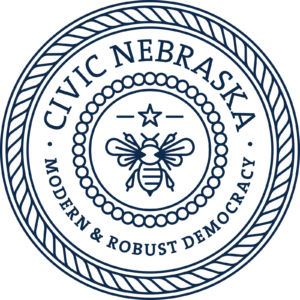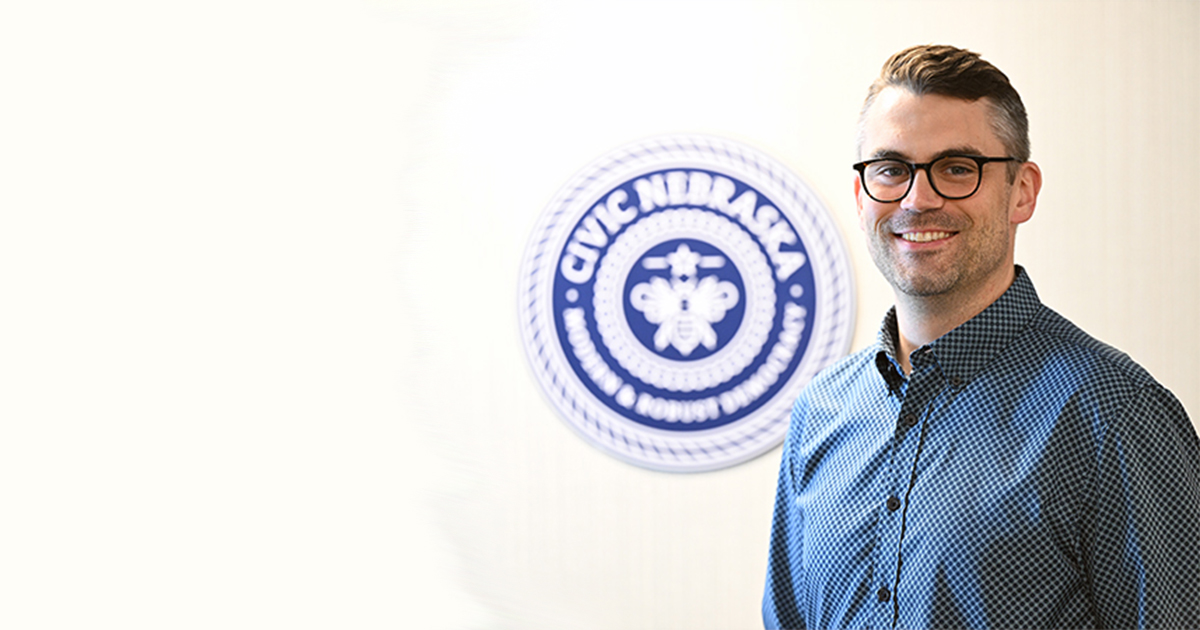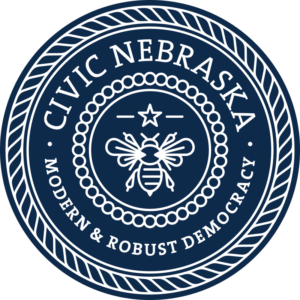On Aug. 2, Kyle Cartwright stepped into the role of interim executive director at Civic Nebraska. Kyle, a native Nebraskan with deep nonprofit experience, is also our organization’s director of development. Recently, Civic Nebraska’s director of communications Steve Smith sat down with Kyle to learn more about what makes him tick and how he plans to usher the nonpartisan nonprofit into a new era.

Steve Smith: Kyle, first of all, thanks for stepping into the role of interim executive director here at Civic Nebraska. How are you feeling about this leadership transition so far?
Kyle Cartwright: Thank you, Steve. I’m incredibly humbled and excited. Adam has left a tremendous legacy, and I’m looking forward to working with our staff and board to build on the strong foundation he established. I feel privileged and honored that the board has trusted me with this important responsibility, and perhaps more so that our staff and leadership have embraced me taking this role. Most important at this moment is maintaining course as we prepare for our next executive director.
Beyond that – I’m sure you feel it too – there’s a sense of great responsibility and optimism that we all feel at Civic Nebraska. Our board, staff, and senior leaders also see the great opportunity in this transition.
SS: Can you tell us a bit about your background in nonprofits and what brought you to Civic Nebraska last year?
KC: Sure. My story is like many others. I had great mentors who saw potential in me and who advocated to put me in positions to be successful and grow throughout my career to date. I graduated from Nebraska U. with a music education degree and always thought I’d be a teacher. But one of our great Lincolnites, Barbara Bartle, recruited me to join the staff at the Lincoln Community Foundation. That’s where I caught the nonprofit bug. From there I led fundraising efforts at the Lied Center For Performing Arts, where I got to work with one of my college professors whom I really respected.
Next, I served for just over four years as the executive director of the Nebraska Cultural Endowment, a $30 million public-private partnership between the state and private donors to sustain the arts and humanities in our state. There, I had the chance to cut my teeth on fundraising and the legislative process, as well as philanthropic grantmaking to hundreds of organizations throughout the state.
Just before joining Civic Nebraska, I had started two consulting practices. One focused on corporate philanthropy and another on building nonprofit fundraising infrastructure. I was working with Civic Nebraska as a consultant in summer 2023 and could sense the energy and talent flowing through this place. I knew I had to be a bigger part of it. The rest, as they say, is history.
SS: Hiring a new executive director will take four to six months, but Civic Nebraska is not an organization that will slow down in the meantime. What are the big initiatives during this interim stretch?
KC: We’re not slowing down, just as the threats to our democracy don’t seem to be, either. This is a big year with the election, and we occupy a space of immense responsibility to convene pro-democracy efforts, as well as to engage voters, youth, and community members in the political process. And, of course, the work doesn’t stop this year. We’ll continue to defend Nebraskans’ voting rights and the integrity of our elections when the legislative session reconvenes in January.
We have several important and exciting initiatives, including a new rural community cohort model called the Idea of America Fellowship that engages community and elected leaders in how to lead and effect change in a modern democracy.
On the youth side, we are excited to launch into our second year of New American Youth Leadership Academy, or NAYLA, programming that engages new American high school students in systems literacy and the four pillars of civic health – political activity, community engagement, social connectedness, and confidence in institutions. We’re also spearheading a statewide curriculum that engages fifth graders in systems literacy and gives them a unique opportunity to build a campaign platform, engage their peers, and run for office. We’re excited about this one. More to come on that very soon!
SS: This year, Civic Nebraska has been a convener to wrestle with the rapid advancement of artificial intelligence and its effect on democracy. How do you see AI as both an opportunity and a challenge?
KC: I’m glad you asked because this is a topic on which Civic Nebraska is uniquely positioned to lead. Earlier this year, we held the first AI and Democracy Community Summit, where we assembled a panel of experts to discuss the ways AI is already changing how we live. As a tool, it’s amazing for research and enhancing data analysis, improving public services, and fostering more efficient communication between citizens and governments. It can help create more informed policy decisions, increase transparency, and lower the barrier to entry on complex policy issues. But it also poses challenges such as the potential for rapidly spreading misinformation, privacy concerns, and the risk of bias in its algorithms.
Ensuring that AI is developed and used ethically, with robust safeguards – especially related to elections and political activity, is crucial to leveraging its benefits while mitigating its risks. We’ll be joining our elected officials this fall as they study the issue more in-depth, so I’ll be excited to report on that more toward the end of the year.
SS: What are some challenges Civic Nebraska faces in the interim, and how do you plan to address them?
KC: Luckily, Civic Nebraska has a very strong leadership team. I’m fortunate in that our programs and initiatives don’t need the executive director hovering over them. That said, Civic Nebraska faces the same challenges that we hear about every day in America: polarization, mistrust, lack of faith in institutions. We’re here to help people and communities bridge divides and strengthen systems, not tear them down. Leadership meets frequently to discuss our programs in the context of these challenges and opportunities that our democracy faces.
Like all nonprofits, we always have room to grow and maximize our impact and focus. The good news is that we’re in a strong position in terms of the people we have in place, fundraising momentum, and programmatic strategy for the next year to address these challenges.
SS: We have to address the biggest event that will happen during your interim tenure: The 2024 election. What do the next three months look like for our Voting Rights Initiatives teams?
KC: Civic Nebraska is committed to ensuring the integrity of the 2024 election, and we’ll do it in several ways. We’re expanding our voter education programs to inform citizens about their voting rights and the importance of participating in the electoral process. Democracy only works when people participate, so our biggest goal is to make sure Nebraskans recognize their power and the value of their voice by voting.
We’re also increasing our efforts to combat misinformation by providing accurate, nonpartisan information. As always, we will have a robust presence of trained nonpartisan election observers to monitor polling places and ensure that all procedures are followed correctly. Lastly, we will be working closely with local officials to advocate for secure and accessible voting methods, including early voting and mail-in ballots. Our goal is to empower every eligible voter to cast their ballot with confidence.
SS: Finally, what message would you like to share with the supporters and partners of Civic Nebraska?
KC: First, I want to express my deepest gratitude for their continued support and partnership. What Civic Nebraska has become and the mission we represent are bigger than any of us. And thanks to our donors and partners over the years and as we continue ahead, the future is bright for democracy in Nebraska.
Don’t get me wrong, it will not be without bumps and detours in the road, but the institution and vision of Civic Nebraska is here to stay, and together we will successfully navigate into this bright and representative future.
At the end of the day, it’s through our collective efforts – each and every one of us, both individually and collectively – that we can and will make a real difference. I encourage everyone to stay engaged, stay informed, and continue to support Civic Nebraska’s mission. Together, we will build a stronger, more vibrant democracy for all Nebraskans.
SS: Looks like we’ll be busy in the coming months! Thanks for taking a few minutes to share.
KC: Thanks so much for this opportunity to speak with you and to Nebraskans, Steve. Let’s go!



